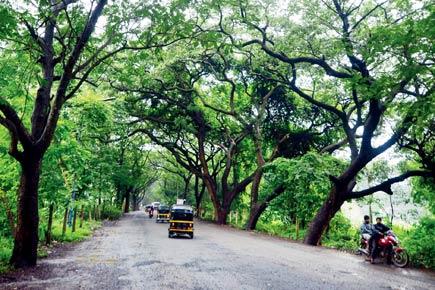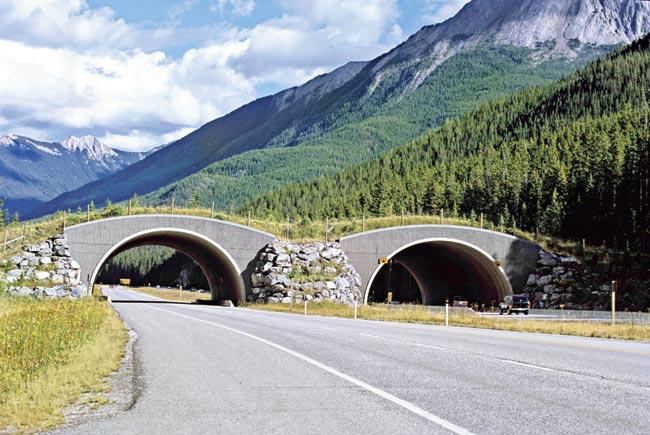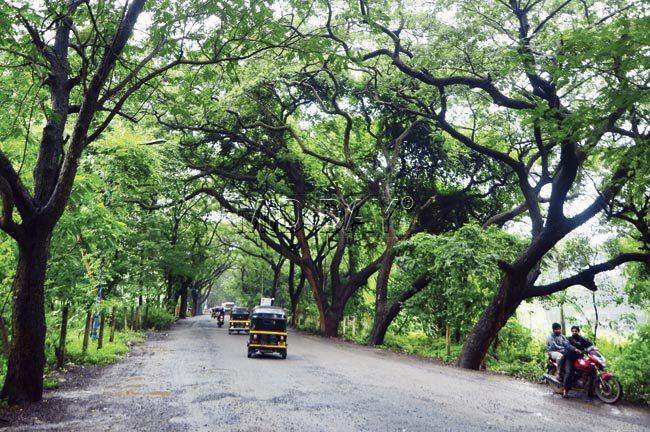Wildlife crossings, which allow animals a safe passage across the road, are the norm in most national parks and forested regions in the developed world, but the BMC is not even considering it in the city

After forcing wildlife out of all the city’s green pockets and squeezing it into the Sanjay Gandhi National Park and the forests of the adjacent Aarey Milk Colony, government agencies are readying another assault on the animals’ natural habitat in the form of the proposed widening of the Goregaon-Mulund Link Road (GMLR).
ADVERTISEMENT

An animal overpass in Banff National Park, Alberta, Canada. Pic/Getty Images
A stretch of the BMC project will be passing through the colony, requiring the widening of the Aarey Milk Colony road from two lanes to four. This will not only entail chopping nearly 1,000 trees from one of the city’s few green lungs, but could also prove catastrophic for the leopards, deer and other animals that inhabit the area.

The Aarey Colony Road is lined with trees on either side, ensuring that they will be the first casualties of the widening project. Pic/Kaushik Thanekar
While such projects in nearly every other country include the construction of an underground wildlife crossing to ensure that the animals aren’t crushed under vehicles, or bypassing sanctuaries and other areas altogether by constructing an elevated road, none of these measures are reportedly even being considered by the BMC.
Up in arms
While conceding that development is necessary, wildlife experts and environmentalists say the BMC can at least make the proposal more green and animal friendly. Speaking to mid-day, biologist and wildlife expert Dr Vidya Athreya said, “My question is why they are bent on getting rid of green spaces, which are so scarce in Mumbai?
Why not make the entire Aarey Colony a green zone for the public and have an elevated road across it? It should not be that big a problem considering that many elevated roads have been constructed in the city lately. The elevated road will ensure that there is no threat to the biodiversity, and studies have shown that the colony is teeming with wildlife.”
“Cutting down trees and widening the road will not only have an adverse effect on biodiversity, but will also increase the chances of wild animals being hit by vehicles while crossing the road. If the road has to be widened, the authorities should construct a wildlife underpass so that wild animals like leopards, jungle cats, civets etc can cross the road without any problems,” he added.
Environmentalist and founder of NGO SPROUTS Anand Pendharkar said, “The widening of the road will not only lead to animals being killed while crossing the road, the reduction in trees will also affect squirrels, monkeys, and the temperatures of Mumbai as Aarey, with its green cover, is one of the coolest places in suburban Mumbai. Depending on the species of trees being chopped, the number of bird species may reduce. The rare hornbills will be especially threatened as they need large trees for nesting.”
Full speed ahead
The Aarey Milk Colony Road came under the jurisdiction of the Aarey Milk Colony CEO earlier, but was taken over by the BMC a few days ago and made toll free. After taking over the road, the civic body had announced that a stretch of the proposed wider GMLR would pass through Aarey Milk Colony and the present two-lane road would be converted into a four-lane one.
The BMC has already begun the survey of trees that might get affected while widening the road and, while the detailed project report will take a couple of months to come out, a surveyor told mid-day that a minimum of 1,000 tress may have to be cut down. “As of now, it is very difficult to predict the exact number, but as per our count, a minimum of 1,000 trees will have to be cut and some more replanted,” he said.
 Subscribe today by clicking the link and stay updated with the latest news!" Click here!
Subscribe today by clicking the link and stay updated with the latest news!" Click here!






